Author: Xinxin
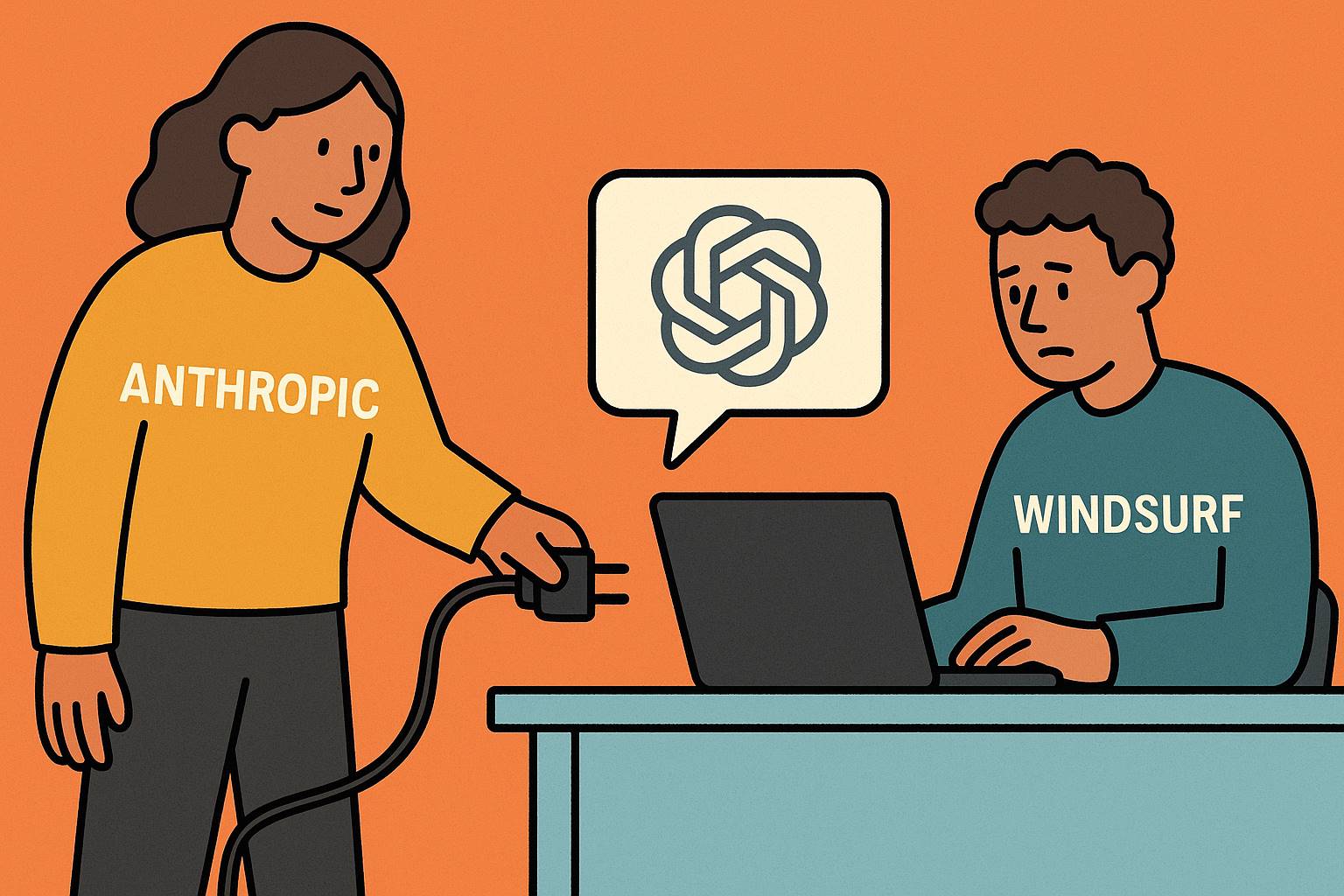
A major acquisition by OpenAI is stimulating the nerves of the entire AI Coding tool market.
In mid-April this year, OpenAI was reported to acquire the "multi-model support" AI programming platform Windsurf (formerly known as Codeium) for approximately $3 billion. (For details, scan the QR code in the picture below to listen to the podcast on Geek Park 👇)
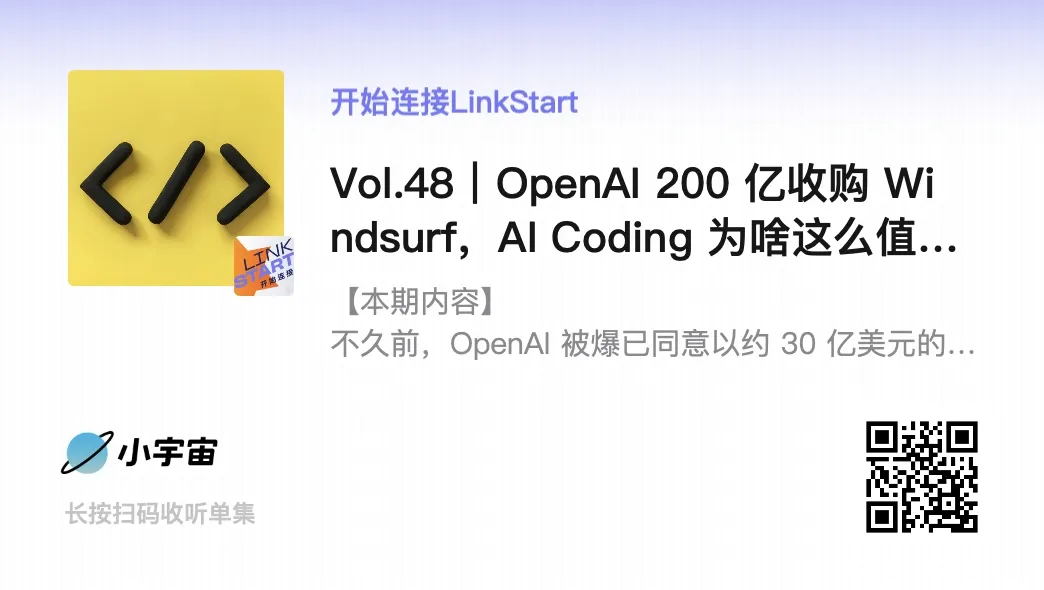
During the transaction process, Windsurf suffered a "heavy blow" from another AI giant, Anthropic: access to the Claude series models was restricted, and even on the day when Claude 4 was released, Windsurf did not get access.
On June 3, Windsurf CEO Varun Mohan publicly complained on X that Anthropic decided to cut off almost all Claude 3.x models, and they "received less than five days' notice."
An AI Coding company, before it even received the acquisition money, suddenly became the "sandwich" in the game between major AI manufacturers and quickly moved towards faction.
Does Anthropic's "cut-off" of Windsurf mean that AI Coding has become a battleground for AI giants? As the hottest entrepreneurial track, how should AI Coding entrepreneurs choose the next step?
01 Windsurf, from neutrality to teaming up
Windsurf was not originally an AI programming company, but a GPU virtualization startup. It was founded in 2021 and transformed into an "AI programming IDE" in 2022. It uses large models to turn natural language prompts into code, understand large code bases, and focus on the "freely switchable models" experience.
In other words, the platform remains neutral and users can choose the model they like. Whether users think Claude is strong, GPT is stable, or Gemini is new, or want to use Deepseek, Grok, etc., Windsurf supports them all.
Its core product is an IDE that supports natural language programming. In addition to supporting multiple models, it also includes the self-developed Cascade Agent, Supercomplete completion system, and real-time preview function. From a VS Code plug-in to an independent platform, Windsurf is a model of "AI-native coding".
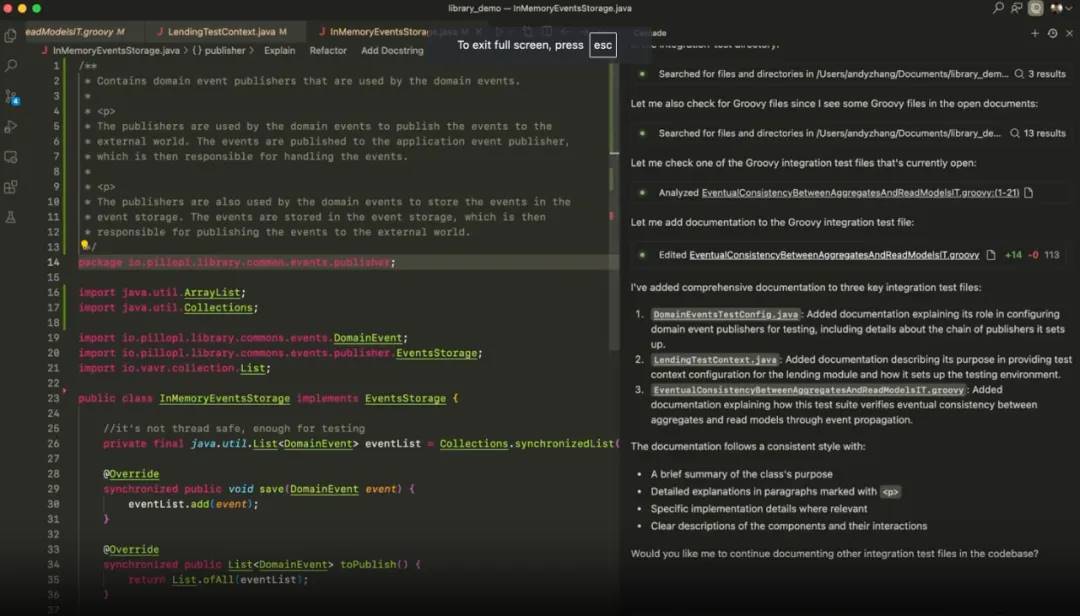
Windsurf’s AI Coding agent Cascade|Image source: Windsurf
This "Vibe coding" model has attracted a large number of programmers and start-ups, and even entered the enterprise user market. By the beginning of 2025, Windsurf said that its annualized revenue (ARR) had exceeded $100 million, and the number of daily active users reached hundreds of thousands. Even though the data is inferior to the more popular Cursor and GitHub Copilot, Windsurf is still one of the strongest in the field of AI programming.
Originally, Windsurf was neutral, but when it was acquired by OpenAI, its "model optional" label became awkward. In the eyes of some developers, this may mean that Windsurf has gone from being a model neutral to being "the exclusive entrance to GPT", and its independence has become an unknown.
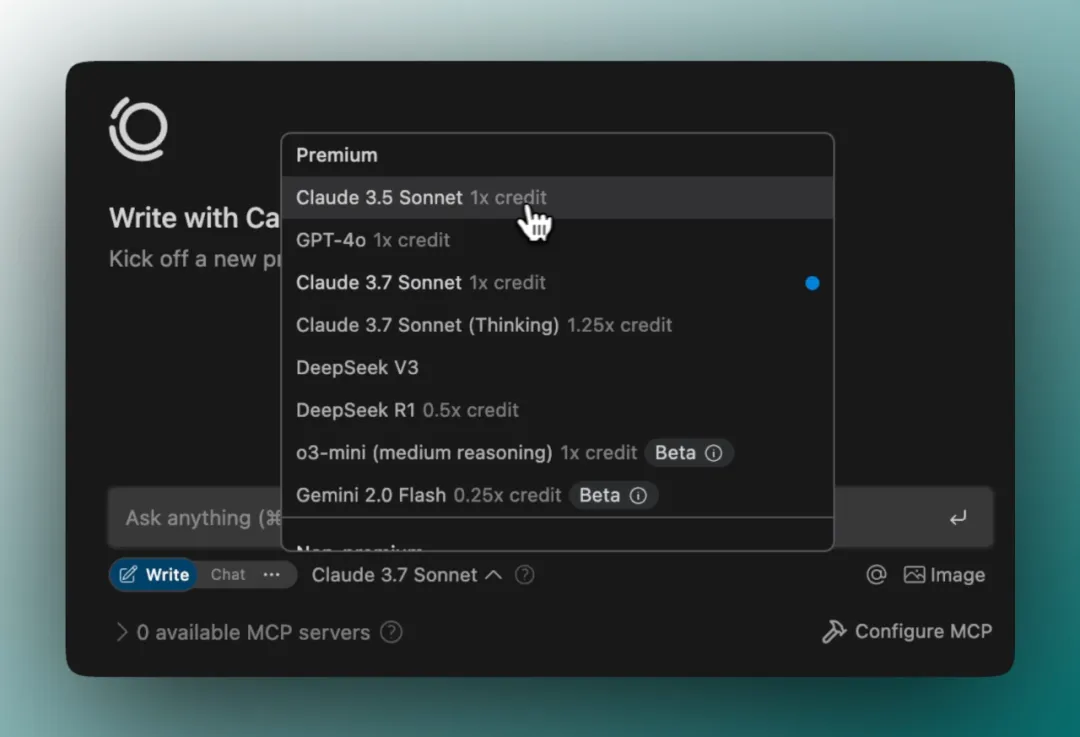
Windsurf originally had a variety of models to choose from, including Claude. Image source: Windsurf
OpenAI has not made a clear statement on whether it will restrict the right to choose models, but its competitor Anthropic has already indicated in advance: it has completely cut off Windsurf's first-party access interface to the Claude 3.x series, and will no longer provide native support for Claude 4. If users still want to use Claude, they can only access it through their own API keys, which is a cumbersome process, more expensive, and less stable.
Judging from the reactions of Windsurf users, some developers are already angry and troubled. Some developers have directly changed tools, such as switching to Cursor, just to continue using Claude 4.
“Due to the short notice from Anthropic, we may experience some Claude 3.x model availability issues in the short term,” Windsurf CEO Varun Mohan complained publicly at X. “We have made it very clear to Anthropic that this is not what we want — our intention is to pay them for full capacity. We are disappointed with this decision and the short notice.”
He also mentioned other manufacturers, saying that in order to ensure sufficient short-term resource supply, the capacity of other inference service providers has been increased. "Gemini 2.5 Pro (currently of very high quality on Windsurf, enjoying a new 0.75x promotional price), GPT 4.1 and more models are not affected. We look forward to continuing to work with all model providers."
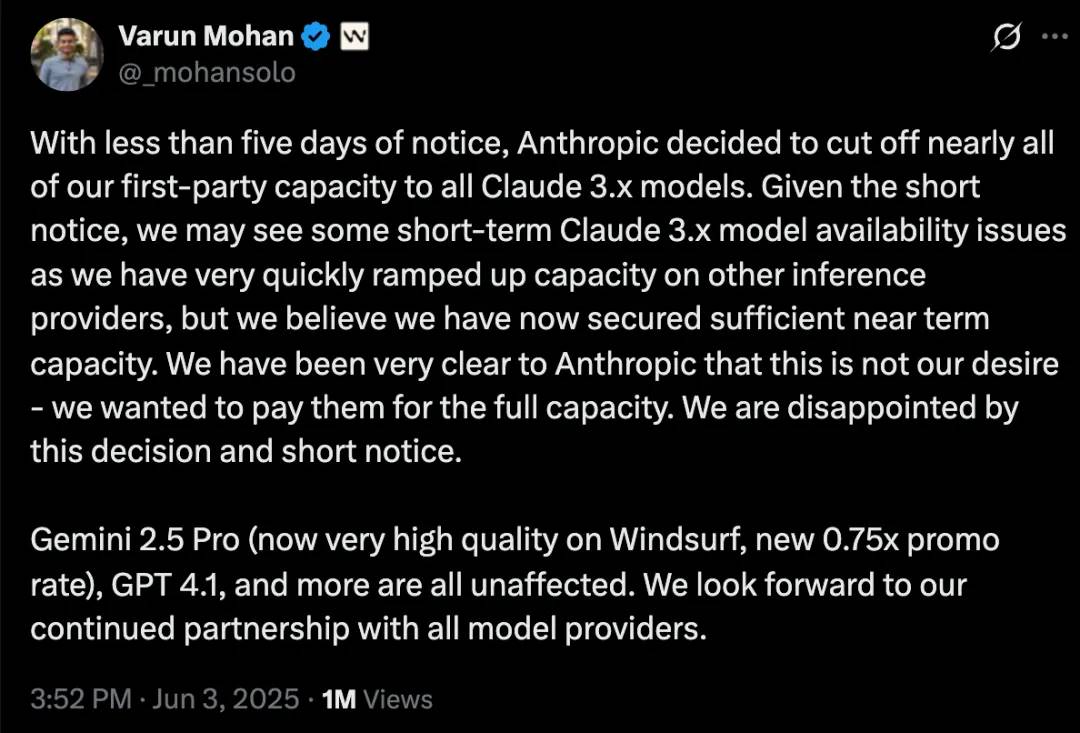
Windsurf CEO complains that Anthropic stopped supplying Claude models | Image source: X
In an official statement released by the company, Windsurf specifically said, "We are concerned that Anthropic's actions will harm the interests of the entire industry, not just Windsurf."
From being a beneficiary of the big model to being forced to choose a camp, Windsurf probably didn't expect that Anthropic's "food cut" action would come so quickly and directly.
02 AI Coding’s “Proxy War”
In the eyes of everyone, Anthropic's action of cutting off the supply of models to Windsurf is of course aimed at OpenAI.
All players in the field of AI programming, whether it is Anysphere's Cursor, Cognition's Devin, or GitHub Copilot, can use Claude. From this, it can be seen that it is not that Claude is unwilling to open up, but that he is unwilling to open up to his "biggest enemy."
Regarding the supply cut, Anthropic’s public relations response was to “prioritize” the allocation of resources to “sustainable” partners. Of course, OpenAI was not mentioned directly, but the industry generally interpreted it as a statement of faction. Anthropic may not want the data of users using Claude on the Windsurf platform to be directly sent to OpenAI.
When Anthropic founders Dario Amodei and Daniela Amodei left OpenAI, they publicly stated that they were dissatisfied with OpenAI's development direction. The two had previously been responsible for OpenAI's security research.
Moreover, Anthropic has billions of dollars of investment from Google and Amazon, while OpenAI is deeply tied to Microsoft and controls GitHub Copilot. All parties want to compete for developer access by supporting tools and controlling models.
It is also worth mentioning that as the programming capabilities of large models are enhanced, Vibe Coding is becoming more and more popular. Anthropic recently not only wants to distribute its own large models to various AI wrapper companies, but also increasingly wants to switch to "self-operation".
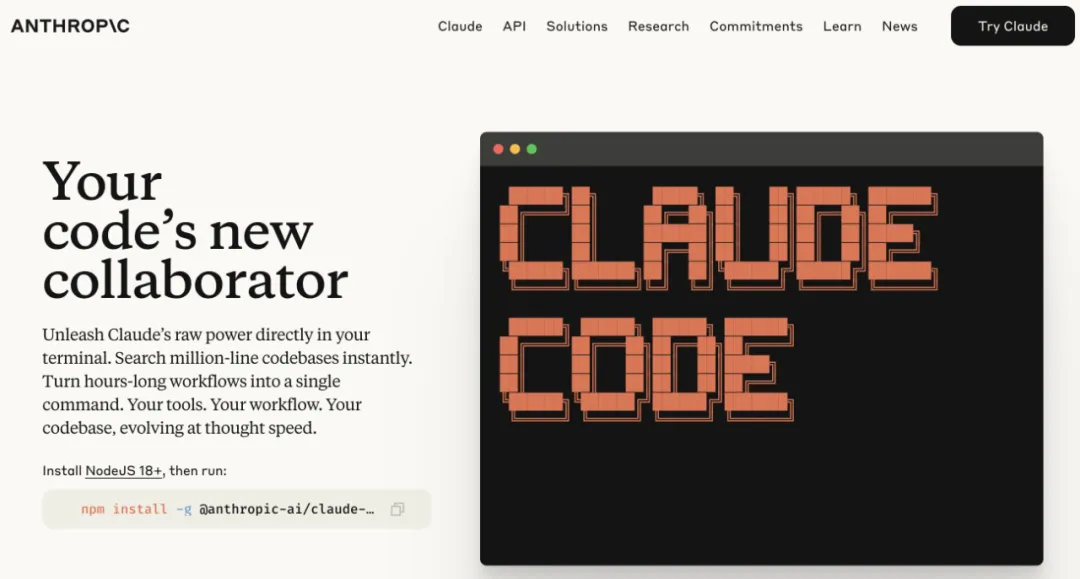
Anthropic launches Claude Code | Image source: Anthropic
In the first half of this year, Anthropic has begun to transfer the use cases of the Claude model to its own products, such as Claude Code, which was just released in February this year, and its own tools that were featured at the "Code with Claude" conference held in May.
After all, Anthropic's current signature feature is the programming capabilities of the Claude model, which is an advantageous selling point in the competition with other large model manufacturers.
Windsurf, now acquired by OpenAI, has made its stance clear and naturally became the first target to be “blacklisted”.
Windsurf's "closeness" with OpenAI became public in April this year. Windsurf CEO Varun Mohan participated in the live broadcast of the release of the GPT-4.1 model. When OpenAI launched a new programming product, he also praised it on social media, praising it as "looking very cool" and saying that "those who turn a blind eye to this neither realize the power of the exponential curve nor understand how great progress this technology will make."
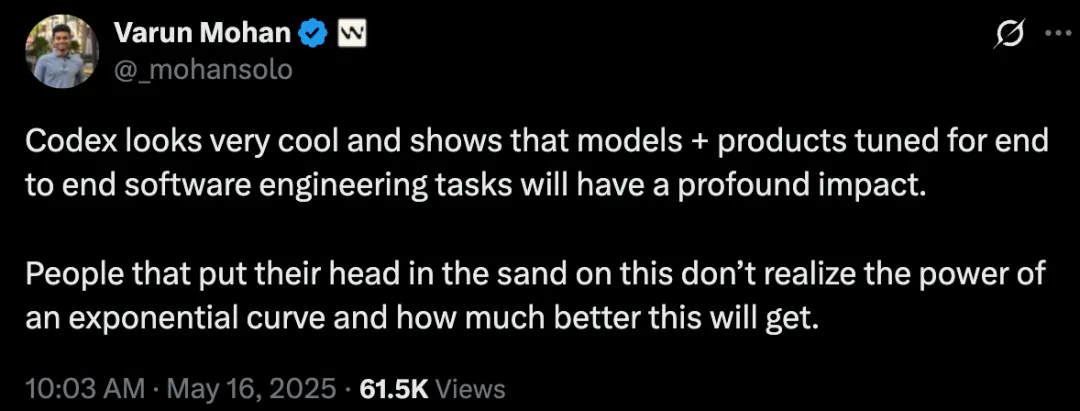
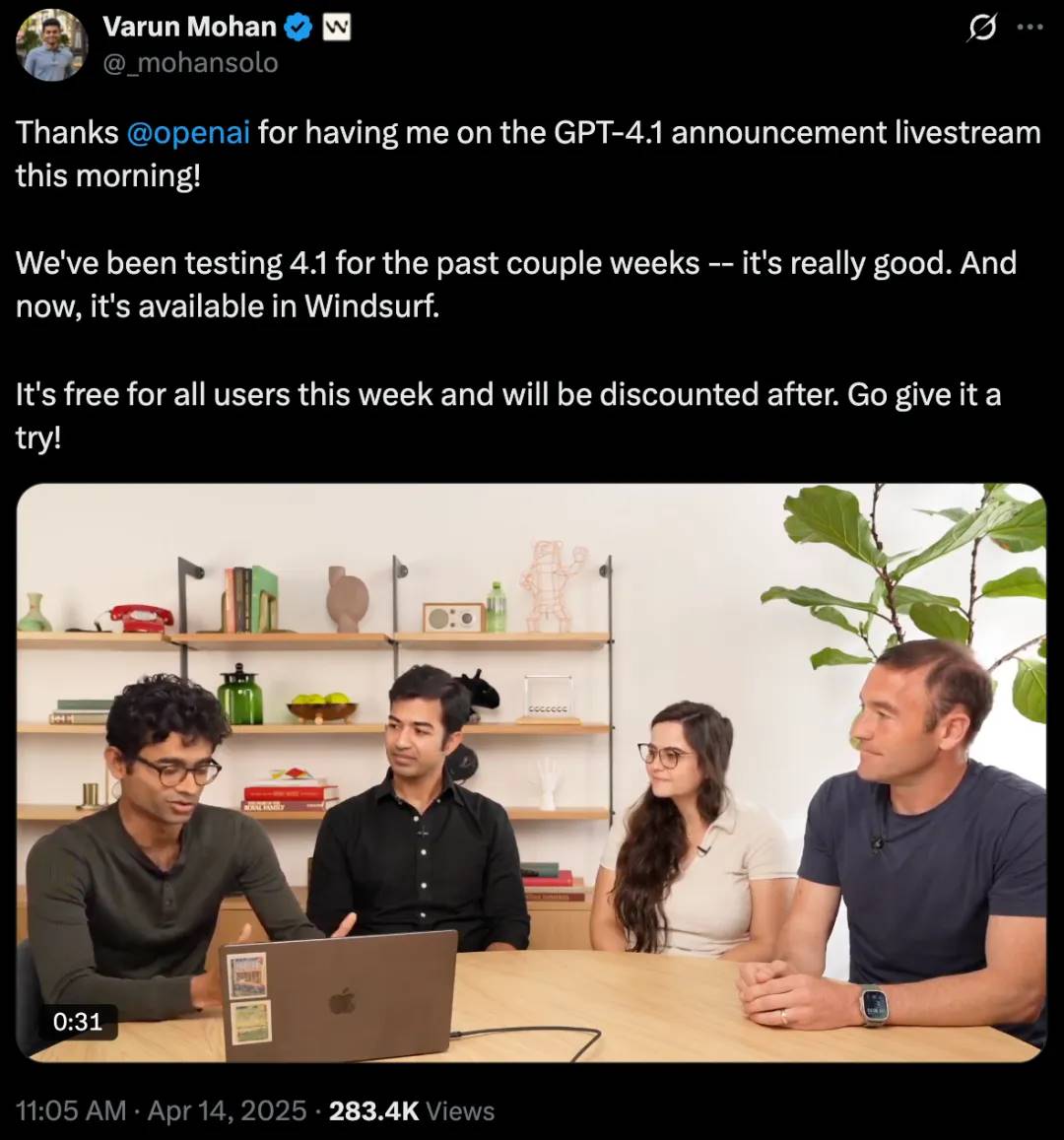
Windsurf CEO (left) interacts with OpenAI products and teams | Image source: X
OpenAI has realized that the simple large-model service model itself may not be sustainable, and has been taking frequent actions at the application layer. AI programming has become one of the key areas. This field is the "traffic entrance" where model distribution competition is fierce.
This year, its actions include integrating the AI programming agent "Codex" into ChatGPT Plus and open-sourcing the local programming agent "Codex CLI". The acquisition of Windsurf may enhance OpenAI's capabilities in developer tools, especially by introducing Windsurf's mature user base into the OpenAI ecosystem, while competing for territory and controlling and weakening the distribution channels of rival large models.
However, no matter what OpenAI will do with Windsurf, has it ever considered Anthropic's reaction? When Anthropic's Claude model programming capabilities are still very powerful, if users turn to other tools, Windsurf's own interests will definitely be affected.
For the entire industry, if the model is bound to a platform, developers may worry whether this is a signal that the AI programming market is moving towards "platformization and closure."
For example, some people may wonder whether development tools in the future will also be fragmented like smartphone operating systems - either iOS or Android; either GPT or Claude.
Windsurf’s “supply cut” by Anthropic was by no means an accidental business decision, but the first shot in the chassis war among AI giants.






